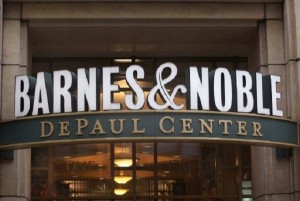Microsoft teams up with Barnes & Noble on ebooks

A sign for Barnes & Noble hangs above a store on April 30, 2012 in Chicago, Illinois. Barnes & Noble plans to spin off its digital business, which includes its Nook e-reader, and partner with Microsoft to form a new business called Newco. With a $300 million investment, Microsoft Inc. will own a 17.6 percent stake in the new unit. Scott Olson/Getty Images/AFP
WASHINGTON — Microsoft teamed up Monday with US bookselling giant Barnes & Noble in a venture aimed at grabbing a bigger share of the rapidly growing market for electronic books.
The world’s biggest software group will make a $300 million investment in a new Barnes & Noble subsidiary focusing on the bookseller’s digital reading capabilities, including its Nook tablet, and its college businesses.
The move ends a long patent dispute between the two firms and brings them together to battle Amazon’s popular Kindle tablet and ebook reader, as well as the surging Apple iPad.
The Nook, which is the B&N competitor in the segment, will get an application for Microsoft’s Windows 8 operating system.
This “will extend the reach of Barnes & Noble’s digital bookstore by providing one of the world’s largest digital catalogues of e-books, magazines and newspapers to hundreds of millions of Windows customers in the US and internationally,” a joint statement said.
The investment will give Microsoft a 17.6 percent stake in the as-yet unnamed unit that “will accelerate the transition to e-reading, which is revolutionizing the way people consume, create, share and enjoy digital content,” the statement said.
The alliance appeared to offer benefits for both firms: Microsoft gets an entry into the tablet computer segment dominated by Apple and devices powered by Google’s Android operating system, while B&N gets a much needed cash injection.
“This is big news for both Microsoft and Barnes & Noble,” said independent analyst Jeff Kagan.
“It not only gives the Nook a shot in the arm, but gives Microsoft new ground to expand their brand and market new services.”
Neil McDonald of the consultancy Gartner said that the primary motivation for Microsoft was to get the Nook to use the Windows operating system.
“This is really Microsoft playing catchup” in the market for e-readers, he said, “but I don’t believe it fundamentally changes the ebook market.”
Barnes & Noble, which has been struggling with red ink from its brick-and-mortar stores, saw its shares skyrocket in opening trade as much as 85 percent, and in morning trade had gained 65 percent to $22.53. Microsoft shares gave back early gains and were down a marginal 0.05 percent at $31.96.
Analysts noted that the investment values the Nook unit at $1.7 billion, more than value of Barnes & Noble itself before the deal.
In January, Barnes & Noble — whose market value has plummeted in recent years — had announced plans to spin off its digital business to maximize value for its shareholders.
“The shift to digital is putting the world’s libraries and newsstands in the palm of every person’s hand, and is the beginning of a journey that will impact how people read, interact with, and enjoy new forms of content,” said Microsoft president Andy Lees.
It was not decided whether the separation of the new unit will involve a new stand-alone company, according to the statement.
In February, Barnes & Noble unveiled a new version of its Nook tablet, with the same $199 price tag as Amazon’s Kindle Fire.
The announcement comes weeks after the US Justice Department sued Apple and five publishing firms alleging a conspiracy to raise prices and limit competition for e-books. The suit is expected to open up competition in the market.
More than $2 billion will be spent this year on e-books, according to Forrester analyst James McQuivey, and the figure is projected to top $10 billion dollars annually by 2016.
Slightly more than a fifth of US adults reported having used an e-book during the past year, their ranks swollen by the popularity of Kindles, Nooks, iPads and other gadgets during the year-end holiday gift-giving season, according to one survey.
Last year, Microsoft sued B&N and others, claiming the Android-based e-reader violated Microsoft patents. Barnes & Noble responded by alleging Microsoft was illegally trying to kill the Android system by asserting patent infringement.